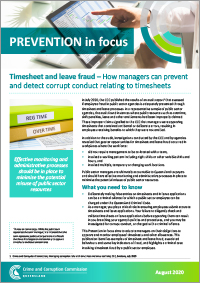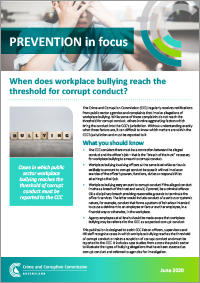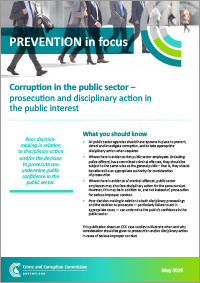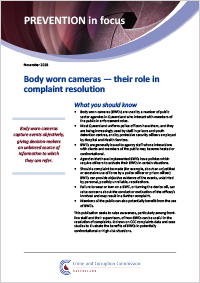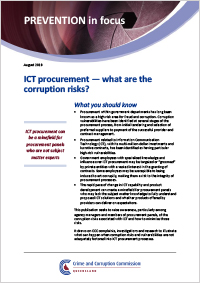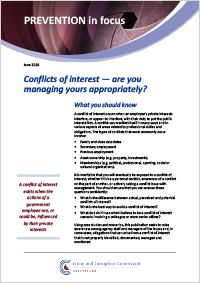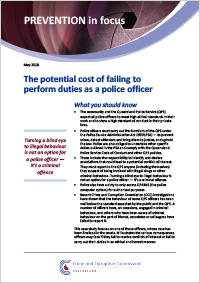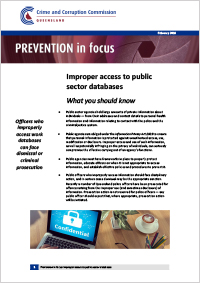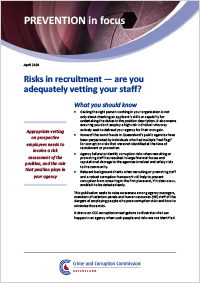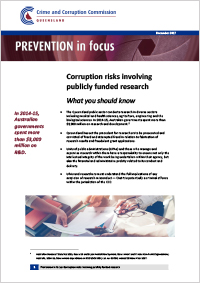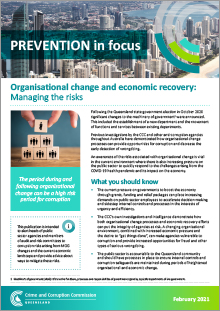 "Crime and corruption prosper when individuals put their private interests before the public interest. It’s that simple. The Crime and Corruption Commission’s (CCC) work in the last few years has unfortunately demonstrated that the threat of corruption remains. Whilst it manifests in new ways, we all need to work together to identify and extinguish it.
"Crime and corruption prosper when individuals put their private interests before the public interest. It’s that simple. The Crime and Corruption Commission’s (CCC) work in the last few years has unfortunately demonstrated that the threat of corruption remains. Whilst it manifests in new ways, we all need to work together to identify and extinguish it.
"Building strong cultures of integrity is the single most significant action our public sector leaders at all levels can take to address corruption."
Alan MacSporran QC
Former CCC Chairperson
The Prevention in focus series draws on CCC investigations to highlight specific prevention lessons for the Queensland public sector.
 Two criminal prosecutions following investigations by the CCC highlighted the importance of governance and transparency in the procurement processes for government contracts. This publication outlines the importance of implementing internal controls and reporting processes to identify and prevent attempts to corrupt procurement processes.
Two criminal prosecutions following investigations by the CCC highlighted the importance of governance and transparency in the procurement processes for government contracts. This publication outlines the importance of implementing internal controls and reporting processes to identify and prevent attempts to corrupt procurement processes.
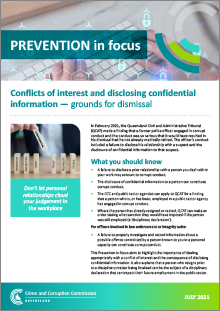 This Prevention in focus aims to highlight the importance of appropriately dealing with a conflict of interest and consequences of disclosing confidential information.
This Prevention in focus aims to highlight the importance of appropriately dealing with a conflict of interest and consequences of disclosing confidential information.
Failing to disclose and properly manage a conflict of interest — such as when your work requires you to take action or make a decision in relation to a person with whom you have a relationship — can constitute corrupt conduct.
Public sector employees need to be mindful of social, personal and family relationships, who you engage with, and how much information you share — particularly if you work in finance, contract management, law enforcement, regulatory compliance, or procurement. It may mean that you are seen as a person who can facilitate beneficial outcomes for others.
This edition explains how a person who resigns, prior to a disciplinary matter being finalised, can be the subject of a disciplinary declaration that may impact their future employment in the public sector.
 Previous investigations by the CCC and other anti-corruption agencies throughout Australia have demonstrated how organisational change processes can provide opportunities for corruption and decrease the early detection of wrongdoing.
Previous investigations by the CCC and other anti-corruption agencies throughout Australia have demonstrated how organisational change processes can provide opportunities for corruption and decrease the early detection of wrongdoing.
An awareness of the risks associated with organisational change is vital in the current environment where there is increasing pressure on the public sector to quickly respond to the challenges arising from the COVID-19 health pandemic and its impact on the economy. The need for immediate and innovative responses, combined with changing organisational structures and oversight mechanisms within departments, presents new risks and opportunities for corruption.
This publication is aimed at the heads of public sector agencies, senior managers and members of audit and risk committees. It aims to alert senior decision-makers to current corruption risks arising from the changing public sector and economic landscape and provide advice about ways to mitigate these risks.
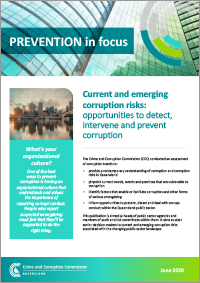 This publication draws its findings from a recent assessment conducted by the CCC of corruption trends in the Queensland public sector. It is aimed at heads of public sector agencies and members of audit and risk committees. It is intended to alert senior decision-makers to current and emerging corruption risks associated with the changing public sector landscape, to raise awareness of their enablers and inform strategies aimed at preventing the incidence of corruption.
This publication draws its findings from a recent assessment conducted by the CCC of corruption trends in the Queensland public sector. It is aimed at heads of public sector agencies and members of audit and risk committees. It is intended to alert senior decision-makers to current and emerging corruption risks associated with the changing public sector landscape, to raise awareness of their enablers and inform strategies aimed at preventing the incidence of corruption.
 In recent investigations the CCC has seen some elected officials (mayors and councillors) interfere in decision making that is actually the designated responsibility of the CEO. The conviction and jailing of Chris Loft, former Mayor of the Fraser Coast Regional Council, for attempting to orchestrate the employment of a friend by Council, highlights the serious consequences of such behaviour.
In recent investigations the CCC has seen some elected officials (mayors and councillors) interfere in decision making that is actually the designated responsibility of the CEO. The conviction and jailing of Chris Loft, former Mayor of the Fraser Coast Regional Council, for attempting to orchestrate the employment of a friend by Council, highlights the serious consequences of such behaviour.
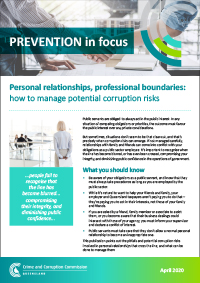 Public sector employees are obliged to always act in the public interest. But sometimes, relationships with family and friends, if not managed carefully, can come into conflict with your professional obligations. This publication points out the pitfalls and potential corruption risks involved in personal relationships that cross the line, and what can be done to manage them.
Public sector employees are obliged to always act in the public interest. But sometimes, relationships with family and friends, if not managed carefully, can come into conflict with your professional obligations. This publication points out the pitfalls and potential corruption risks involved in personal relationships that cross the line, and what can be done to manage them.
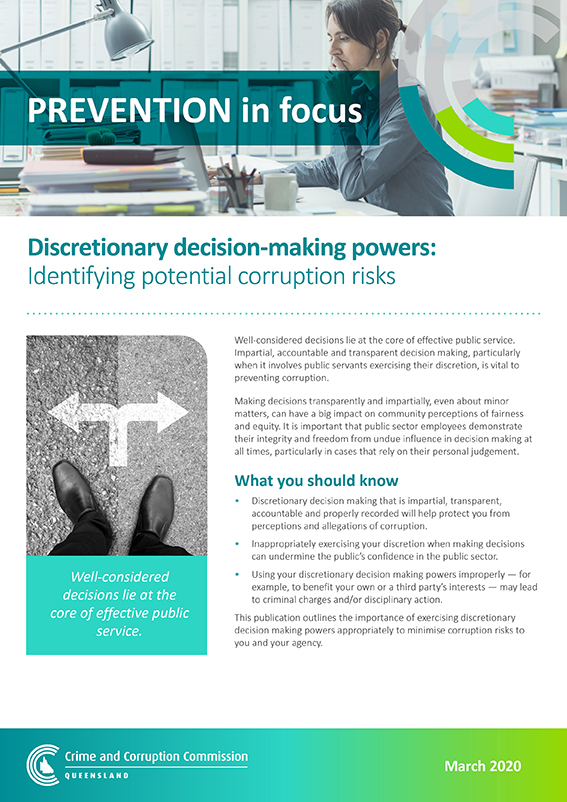 Impartial, accountable and transparent decision making, particularly when it involves public servants exercising their discretion, is a cornerstone of anti-corruption. This publication outlines the importance of exercising discretionary decision-making powers appropriately to minimise corruption risks.
Impartial, accountable and transparent decision making, particularly when it involves public servants exercising their discretion, is a cornerstone of anti-corruption. This publication outlines the importance of exercising discretionary decision-making powers appropriately to minimise corruption risks.
Originally published March 2020, updated December 2020.
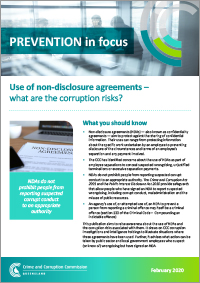 Public sector agencies may legitimately use non-disclosure agreements (NDAs) to protect their confidential information. This publication looks at what can happen when agencies use them to cover up wrongdoing. It also advises what action can be taken by public sector and local government employees if they suspect wrongdoing in their workplace but have signed an NDA.
Public sector agencies may legitimately use non-disclosure agreements (NDAs) to protect their confidential information. This publication looks at what can happen when agencies use them to cover up wrongdoing. It also advises what action can be taken by public sector and local government employees if they suspect wrongdoing in their workplace but have signed an NDA.
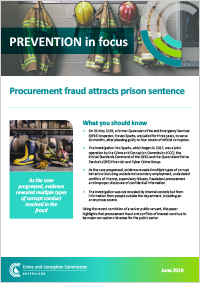
On 31 May 2019, a former Queensland Fire and Emergency Services (QFES) Inspector received a prison sentence after pleading guilty to four counts of official corruption. This publication highlights that procurement fraud and conflicts of interest continue to be major corruption risk areas for the public sector.
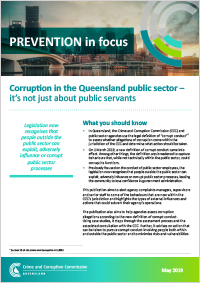
On 1 March 2019, a new definition of corrupt conduct came into effect, broadening the CCC’s corruption jurisdiction. The legislation now recognises that people outside the public sector can adversely influence or corrupt public sector processes, damaging public confidence in government administration. Using recent case studies, the publication highlights the CCC’s broader jurisdiction and the types of external influences that could subvert public sector operations.
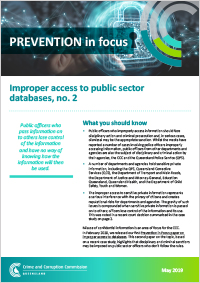
Misuse of confidential information is an area of focus for the CCC. In February 2018, we released our first Prevention in Focus paper on improper access to databases. This is the second publication on the topic and highlights that disciplinary and criminal sanctions may be imposed on public sector officers who don’t follow the rules.

